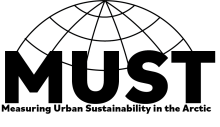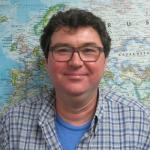Arctic Cities: Measuring Urban Sustainability in Transition (MUST)
Navigating the New Arctic (NNA) is one of NSF’s 10 Big Ideas. NNA projects address convergence scientific challenges in the rapidly changing Arctic. This Arctic research is needed to inform the economy, security and resilience of the Nation, the larger region and the globe. NNA empowers new research partnerships from local to international scales, diversifies the next generation of Arctic researchers, enhances efforts in formal and informal education, and integrates the co-production of knowledge where appropriate. This award fulfills part of that aim by addressing interactions among social systems, natural environment, and built environment in the following NNA focus areas: Arctic Residents, Data and Observation, Education, Global Impact, and Resilient Infrastructure.
Arctic cities face multiple challenges from social and economic transformations, deteriorating infrastructure, a changing environment, and pressures on their governance systems. To respond effectively, mayors, city councils, agency leaders, local citizens and residents, and other stakeholders need a clear set of indicators to help them understand changes in Arctic conditions and provide guidance in devising infrastructure and governance strategies to achieve future prosperity and spur sustainability. This NNA Collaboratory project assesses numerous issues of urban sustainability and compiles a set of metrics on Arctic conditions that provides data about changes in several issues, including the natural environment, energy, and socio-cultural issues. With these indicators, policymakers and stakeholders can develop effective governance systems and design and build infrastructure to meet the challenges of a shifting natural environment and economy in Arctic urban areas.
This NNA Collaboratory expands upon a database of indicators on various topics in numerous cities on natural conditions in the Arctic. The Collaboratory cultivates theories and test hypotheses in the natural, social, and urban planning sciences by developing new indicators for Arctic conditions that include historical data, enabling examination of dynamic trends and relationships among the various components of urban sustainability. The Collaboratory advances a long-term research agenda and platform around Arctic urban sustainability by organizing collaborations among the Arctic research community and facilitating convergence research on the natural, social, and built environment transitions taking place in and around Arctic cities now and in the future. Indicators introduce a shared vocabulary with explicit measures and assumptions that allow scholars and others across disciplines to interact while providing a foundation for theory building and testing. Working with Indigenous and other communities, the Collaboratory also engages in case studies of divergent Arctic urban areas to examine city-level data for interlinkages among assorted elements of sustainability. Consequently, this NNA Collaboratory improves the ability of policymakers and stakeholders to promote sustainability by providing tools to measure progress, identify areas of most urgent need, select verifiable best practices, examine opportunity costs, and determine where external actors can have the greatest impact.
The goal of this collaboration between Orttung (2127364, George Washington University), Berman (2127365, University of Alaska, Anchorage), Petrov (2127366, University of Northern Iowa) and Jull (2127367, University of Virginia) is to create indicators to help policy makers measure changes in the natural environment to devise infrastructure and governance strategies that will assist Arctic cities to achieve future prosperity. Creation of the indicators will establish a solid foundation for starting community conversations, clarifying values, measuring both the status quo and progress going forward, and understanding the linkages among the various elements of urban sustainability in extreme climatic conditions. The indicators introduce a shared vocabulary and explicit measures and assumptions that will allow studies across a variety of disciplines to validate, challenge and speak to each other. Beginning in 2022 through 2026 a field team of 15-25 will travel to Fairbanks, Alaska, Yellowknife, Canada, Luleä, Sweden, and Yakutsk and Naryan-mar, Russia. To determine a baseline of citizen concerns, researchers plan to conduct one-on-one interviews and hold discussions with small groups where possible. Researchers will seek as many different perspectives as feasible, including from elected officials, the private sector, and non-profit organizations. To collect data from the five case study cities and to provide international, hands-on, experiential learning and specialized study in Arctic locations and present students with the opportunity to witness and participate in active field research, field courses will be developed in collaboration with partners from Moscow State University (V. Grebenets, N. Zamyatina) and local partners in each of the cities. The field classes will be conducted in Luleä (Year 1), Yellowknife (Y2), Fairbanks (Y3), Yakutsk (Y4), and Naryan-Mar (Y5). Each trip will be planned in accordance with the overall research effort and the faculty and student participants will use their time on the ground to collect as much data for indicator production as possible.
See the full logistical summary here: https://api.battellearcticgateway.org/v1/reports/grant?proposal_num=2127364
Co-Principal Investigators
Publications









